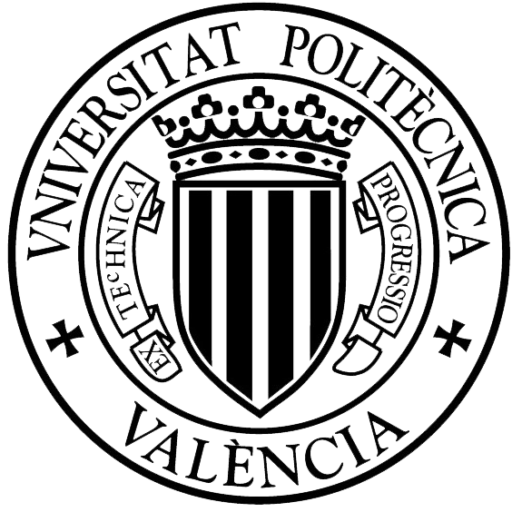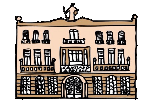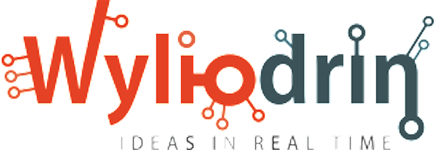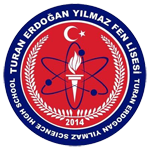
Universidad Politécnica de Valencia
UPV is a public Higher Education Institution actively involved in international cooperation and mobility projects. UPV hosts nearly 30K students and employs over 4K people (teaching, research, and administrative staff). It is the first technological university in Spain according to international rankings (e.g. Shanghai Ranking of World Universities) and offers 39 undergraduate programmes, over 80 official Master’s degrees and 30 Doctorate programmes. UPV focuses mainly on engineering and technical studies and receives every year over 1,8K exchange students and sends over 1,4K UPV students abroad under different mobility programmes. UPV has ranked amongst the top 5 European Universities in
student exchange figures under the Erasmus+ Programme. UPV has experience in the management of European projects and takes part in different actions: Erasmus+, Creative Europe, Horizon2020, etc. Academic staff at UPV has procuded more than 24K video learning objects, of which 10K are uploaded to its Youtube channel (+53M views). It has the biggest flipped teaching initiative in Europe with more than 350 university courses flipped and is one of the most important MOOC producers in Europe with 89 MOOC and more than 2M enrollments. In addition to high education formal studies,the UPV senior university is integrated in the vice-rectorship of social responsability and cooperation, and responsible for managing the educational program for people over 55 years. This program aims to bring the University closer to people who maintain the enthusiasm to continue learning. The Senior University is also supporter by the Valencia Goverment (GVA), through the Ministry of Science and Innovation. The UPV School of Informatics (ETSINF) is one of the best-valued Informatics Schools in Spain. The research capacity of the ETSINF positions it to the 83rd of the world university in computing of the NTU Ranking 2014 of Taiwan, which measures, both the quality and quantity of the research developed in universities around the world from scientific articles published by each institution. ETSINF is currently hosting ERASMUS+ project esGarden from which one member will participate in this project too. UPV is
committed to the success of this project and is eager to actively engage not only in academic activities but also in the management bodies in the consortium. UPV as coordinator, is willing to cooperate with all partners by providing extensive scientific know-how in this area, technical capabilities and sound management structures and experiencies.

Colegio Santiago Apóstol
Santiago Apóstol Primary School is a private education institution held by Valencia’s Archbishopcric, located in Valencia, specifically in the Cabañal neighbourhood, which is an area with a considerable percentage of immigrants (17%). Half of these people are Roma people coming from Romania and most of them lack the most basic knowledge of Spanish language, a decent income or a safe dwelling. Due to obvious reasons it is impossible to know exactly how many Spanish Roma people are currently living in the neighbourhood, but some studies clearly set Cabañal as one of the metropolitan areas with the highest percentage. We currently have 200 students, 98% of which is Roma and come from families at
serious risk of social exclusion, either due to economic, labour or racial reasons. We’re currently employing 26 teachers, 11 educators, 2 psychologists, 1 pedagogue, 1 social worker and 1 secretary. We’re well aware of the inherent complexity of the task related to educating kids coming from such a disadvantaged environment, and for that reason we decided to offer an integrated solution by turning our school into a Learning Community in 2010. We’ve based our daily work on the dialogical approach and we’ve put in practice several effective educational actions like the Interactive Groups, Dialogical Literacy Circles, Families’ and Volunteers’ Training, Educational Participation of the Community, the
Dialogical Model for Conflict Prevention and the Dialogical Teachers’ Training. Some years ago we started an Innovative Education Program focused on fostering our students’ motivation through ICT, whose output have been so far the School Radio, the “gamification” of our methodologies, the “Creativity Development through digital media” Course and the “Programming and Robotic” Course. Hence we’ve developed some experience related to the pillars of our methodologies, i.e.:
• Fostering motivation to prevent early dropout and absenteeism;
• Education innovation through formal and nonformal techniques;
• Prevention, management and solution of school conflicts;
• Implementation of intercultural and immigration issues in our curriculum;
• Modernisation of the school workflow.
We have been working as a Learning Community since 2010, in which we implemented the Dialogic Learning methodology and we opened the school workflow to parents, neighbours, members of the local roma community, private companies and local institutions. Ten years later, we are proud to say the our education centre is a reference point within our neighboourhood not only for educational reason, but also for social inclusion standards. We have created special literacy courses for adults, the Mothers’ school to teach them healthy habits, parental skills, women empowerment and house management, the “Early Morning School” to give our most economically disadvantaged pupils breakfast, personal hygiene and non-formal teaching. Our goal as an education institution is fuse together innovative pedagogy, social inclusion and formal and non-formal learning.

STANDO LTD.
STANDO LTD (STANDOUTEDU) is a research and educational organisation based in Cyprus, dedicated to the advancement of research and innovation. We are, at the same time, an approved VET Centre accredited by the Human Resource Development Authority of Cyprus. The strength of our enterprise primarily lies in our highly qualified team and its extended network of international partners. STANDO LTD has 5 full-time staff, 10 part-time and more than 20 volunteers.Our dynamic and experienced academics, researchers and practitioners are committed in implementing large scale co-funded projects and collaborate with organizations from Cyprus and around the world. We actively participate in the planning and implementation of national and international projects, aiming at providing innovative solutions that
facilitate the development of people and the cohesion of societies. Since 2016, we are providing a series of professional and academic trainings under the scope of Erasmus+ KA1 and KA2, as well as courses, seminars and consulting services to various target groups (children, students, youths, teachers, policy makers, parents, adults), learners and staff of Vocational Education and Training (VET) providers and Adult Centres. Our Vision To be one of the premier research and educational organizations in Europe, recognized for its excellence in research advances and educational opportunities offered in diverse contexts and clients. Our Mission To give education a new dimension through innovative programs and instructional practices and to promote leading-edge research contributing to the betterment of education in today’s complex global environment. Our Objectivesare:
• To promote next generation learning in European and international level.
• To conduct high-level research in various educational fields and develop new academic foundations and vision.
• To encourage the interconnection and cooperation between societies all over Europe and worldwide .
• To strengthen the role of civil society, trade unions and democratic processes towards establishing equality and social justice for all.
• To protect the rights of children and ensure that the rights of girls, boys and young people are upheld and supported so that they may reach their full potential and grow in a healthy environment.
• To encourage the social inclusion of minority groups through non-formal educational methods (i.e imigrants and war refugees).
• To foster entrepreneurship and innovation competencies, especially in women (mothers, women belonging to minority groups, NEETs).
• To promote the personal and professional development of various target groups (students, young people, professionals, adults).
• To encourage sustainable development in the frames of the Sustainable Development Goals (SDGs).
Our enterprise promotes the educational activities, professional and social skills development of children, young people and adults in order to be able to adapt and to integrate effectively in a dynamic society. We are also committed to social integration and give equal opportunities to vocational skills learning for the most disadvantaged groups of people, those with special educational needs, social problems, and those with a high risk of social exclusion. We aim to contribute to the economic and civic growth of individuals, through lifelong education and training for personal and professional development in accordance with the current requirements of the labour market. We wish to enhance people empowerment, entrepreneurship, creativity, social inclusion and the acceptance of cultural diversity through intercultural learning. We encourage people to develop their ideas and initiatives into concrete projects and we tend to develop their creativity and entrepreneurship skills. We adopt and implement various innovative initiatives in the field of formal and nonformal education, providing information, counseling, training to both young people and professionals.

Wiliodrin
Wyliodrin is a small company established in 2014. It is an IT company that offers an educational platform which allows programming of embedded devices. The main activities of Wyliodrin involve education and the Internet of Things (IoT).
The founders of Wyliodrin are engineers working in the educational field that identified a lack of development tools and studying materials in the emerging branch of IoT. Wyliodrin services allow beginners, which have a hard time working with these technologies, to better understand basic IoT notions. Wyliodrin aims to make the Internet of Things field more accessible to people studying this subject, thus increasing the number of future IoT specialists. The company has had collaborations with Intel®, Inlea, Telekom, ALP Dilingen and their product is being used in teaching at UCLA, Ohio
University, Ulm University, University of Alaska, Waterford Institute of Technology, CoderDojo Ireland, Politehnica University of Bucharest.

TURAN ERDOĞAN YILMAZ FEN LİSESİ
Turan Erdogan Yılmaz Science High School was established by a benefactor and it started its education in the 2014-2015 academic year. It is a boarding science high school. It is located in the Southern part of Turkey in Kalkan, Antalya. It is a regional public school. Our school is 220 kms away from the center of province, Antalya and 28 kms from the center of district, Kaş. There are 30 teachers and 400 students.330 students stay at our dormitories , most of them come from different cities of Turkey. They prefer our school because we are one the 11 Science High Schools in our district, Antalya and 310 Project Science High Schools in Turkey. As Science High Schools , we apply an intensified curriculum on Science and Maths courses.We have extra advantages for successful but poorer students such as free dormitories
including free meals and monthly financial support to enable them continue their education.We also have to give priority to students who do not have High Schools in their residency. There are 16 classrooms, a chemistry, physics and a biology laboratory, a chess room, a library, a multi-purpose conference room, an outdoor basketball court, two dormitories for male and female students. Our educational programme is university- oriented and mainly based on science education.
We train students specifically for higher education in science, technical and medical fields. We are a public high school for students who have exceptional aptitude in the sciences in Kaş / Antalya TURKEY.Our students are selected via a national exam.We accept the first 7% of the students who took the exam.So our students are well motivated and eager to learn.We intend to take part in this application as we believe that we should give our disadvantaged students the equal opportunity to be a part of international community. We have experience in Coding and Robotics and we care about environmental issues.Our teachers and students prepared for many national competitions and projects on ICT and environment, some of these are; Technofest ( National Competition) – Commercial Short Distance Engined Aerospace
2020 National Science High Schools Congress – SüBOT-S01 –Autonomous Spying ,attack and sabotage Robot 2019 TÜBİTAK (Turkey Scientific and Technological Research Institution) – 4007 Project – We are Damn Curious 2019 (Environment Project)- https://yerdengogemerakliyiz.wordpress.com/athep/ National Science High Schools Congress – Using Image Processing Systems in School Counselling Service 2018. Call 2020 Round 1 KA2 – Cooperation for innovation and the exchange of good practices KA201 – Strategic Partnerships for school education.
Alliance building
The selection process was based on the need to gather partners with a hi-tech profile: the specificity of
this project is too high to let schools with no ICT expertise take part in it.
AO is a leading institution at European level in technology, engineering and design, accredited with the Erasmus Charter of Higher Education. Its School of Design is one of the best-valued in Spain. Its role as the leading organisation in this partnership is fully justified by the outstanding experience, know-how, assets and technology that it is able to offer.
P1 has been implementing several ICT pilot courses to foster the use of technology, apps, software and robotics in the classroom. From the social perspective, the school can undoubtedly be classified as “ghetto”, with an overwhelming 90% of Roma pupils coming from families at risk of social exclusion. Despite the objective difficulties that working with such a population implies, the school has managed to become a pillar in the educational and social life of the neighbourhood, also due to the modernisation process that was undertaken 10 years ago. Its situation is, in our opinion, the ideal one to test innovative technology-based methodologies with pupils that face serious social inclusion problems. Moreover, P1 has already participated in KA101, KA229 and KA120 projects.
P2 is a SME specialised in innovative methodologies in formal and non-formal learning. It also focuses on social inclusion, entrepreneurship, ICT and sustainable development. Its coordinator is a researcher in the field of Environmental Education and Education for Sustainable Development and has an impressive expertise in Erasmus+ projects. P2 role in this partnership will be environmental and non-formal learning consultant.
P3 is a SME that focuses on engineering and software development, but also on creating documentation for educational purposes. The enterprise has already participated in a KA203 Programme in 2016 and it is therefore familiar with the Erasmus+ project structure and development. Its role in this partnership will be providing an irreplaceable technological consultancy, along with an effective insight on the possible implementation at industrial level of PR1 and PR2.
P4 is a Science High School established in 2014 which prepares its students for higher education studies in fields like Mathematics, Physics, Chemistry, Biology and Engineering. The education centre offers students from economically disadvantaged families from all over its region the possibility to get adequate knowledge in the Science field and apply for University. Free dormitories and meals are provided, along with monthly financial support. Nonetheless, P4 aims at excellence in its field and only accepts students with the 7% top marks in the region. Even if the institution as such has not participated in any Erasmus+
project yet, the key people involved have considerable experience in both international and national projects, competitions and prizes. The cultural differences among the countries involved were also a key factor, as it was having different target groups: university, secondary and primary students. The last but not least criterion was having partners with demonstrable experience in previous Erasmus+ calls, alongside partners with no previous experience.